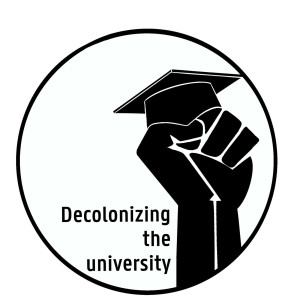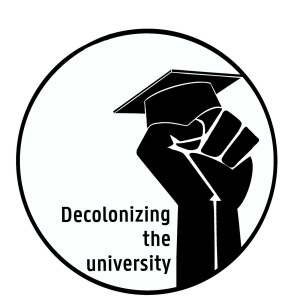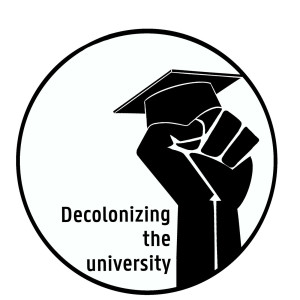Decolonizing The University
Students of Ghent University (PSW) guide you in reflecting about the decolonization of the University. In the first two episodes our guest speakers Professor Azumah Dennis and Professor Koen Bogaert reflect on the influence of colonialism on higher education and the curriculum. The following episodes take a closer look at HR and recruitment decolonization and student culture. These episodes will be published in the course of the second semester. By Lien Steyaert, Ellen Vanden Bulcke and Fien Pauwels - This podcast was made possible thanks to a collaboration between the ’Community Service Learning’ course and the Learning Network on Decolonization.
Episodes

Thursday Jun 23, 2022
Thursday Jun 23, 2022
In these two episodes of the podcast “Decolonizing the University”, Fien Pauwels (National Politics student at Ghent University) talks to Dr. Sibo Rugwiza Kanobana, Prof. Dr. Sami Zemni and Prof. Dr. Jan Orbie on their views on the decolonization of the university’s workforce.
They were asked to give insights on the necessity of diversity within Ghent University and how this can be achieved through a decolonized workforce. We discuss the lack of diversity within universities and which effects this might have on the students and society. In addition, we talked more about the tools currently at hand to try and decolonize the university’s workforce. Lastly, the perverse effects of some of these tools were explored.
In the second part, two professors at the Faculty of Political and Social Sciences reflect on their own positionality within the hiring process and inferences on diversity. Prof. Dr. Jan Orbie is Associate Professor at the Department of 'Political Science' at the research group of "Ghent Institute for International and European Studies" (GIIS), at Ghent University. Prof. Dr. Sami Zemni is Professor at the Department of 'Conflict and Development Studies' where he coordinates The Middle East and North Africa Research Group (MENARG), at Ghent University.

Thursday Jun 23, 2022
Thursday Jun 23, 2022
In these two episodes of the podcast “Decolonizing the University”, Fien Pauwels (National Politics student at Ghent University) talks to Dr. Sibo Rugwiza Kanobana, Prof. Dr. Sami Zemni and Prof. Dr. Jan Orbie on their views on the decolonization of the university’s workforce.
They were asked to give insights on the necessity of diversity within Ghent University and how this can be achieved through a decolonized workforce. We discuss the lack of diversity within universities and which effects this might have on the students and society. In addition, we talked more about the tools currently at hand to try and decolonize the university’s workforce. Lastly, the perverse effects of some of these tools were explored.
In the first part, we interview Dr. Sibo Rugwiza Kanobana, a lecturer in sociolinguistics and postcolonial studies at Ghent University and the Open University of the Netherlands. He reflects on his own experiences and the theory behind diversity and the decolonization of the hiring process.

Tuesday Mar 15, 2022
Tuesday Mar 15, 2022
"Decolonization, which sets out to change the order of the world, is clearly an agenda for total disorder" (Fanon, 1963, p. 2).Fanon, F., Sartre, J. P., Farrington, C., & Grove Press. (1963). The Wretched of the Earth. Amsterdam University Press.In the first two episodes our guest speakers Professor Azumah Dennis and Professor Koen Bogaert reflect on the influence of colonialism on higher education. Professor Azumah Dennis is a senior lecturer who specializes in higher education and is program director for professional doctorates at the Open University in the United Kingdom. Koen Bogaert is an assistant professor at the faculty of conflict and development of the University of Ghent in Belgium, and a member of the Middle East and North Africa Research Group. Our guest speakers talk about the colonial traces in our curriculum and how to combat them through positioning and contextualizing all the authors and perspectives in the curriculum. They highlight the importance of thinking about one's own positionality while teaching and the acknowledgment of it. Furthermore, they word their aspiration and hopes for the future regarding the decolonization of the curriculum. These two first episodes are meant to challenge listeners to give thought to their own ideas of ‘neutrality’ and ‘objectivity’ and how those ideas are related to the colonial knowledge system.Meaning of positionalityA key concept in this podcast is positionality. Positioning yourself refers to recognizing that you don’t speak and talk from a place of a disembodied neutrality (Dennis, 2018). It is acknowledging that your position in the world – your race, culture, gender, class background etc. - shapes your experiences and thus influence the themes you choose to talk about and the perspective that you use to talk about them. This concept can/should be used to oppose the idea that whiteness equals being unmarked, neutral and objective. White (male) scholars have had the privilege to present themselves in their work as unmarked scholars, scholars without a race, gender, or culture, scholars who are the norm. This is what is called the privilege of neutrality. This concept is used to debunk the myth of neutrality and to put everyone and their work in their appropriate context. Meaning of epistemologyEpistemology refers to what is considered knowledge, about what knowledge can be formed, and how we can come to that knowledge (Meghji, 2021). Epistemology is important in academic knowledge construction but the development of certain epistemological regimes in academia has not been independent of the development of colonialism. Western epistemology has reproduced and still reproduces colonial myths and knowledge. In this context, Western epistemology obtained worldwide a hegemonic position in academia that inhibited non-western epistemologies. Decolonization of the academia also means a search for a plurality of epistemologies in scientific and political praxis (Bhambra, Gebrial & Nişancıoğlu, 2018). In that way decolonization challenges the myth that the Western Universities are the only epistemological authorities. Decolonization promotes a horizontal, reflexive, conversational approach to different epistemologies (Meghji, 2021). The inclusion of perspectives from the global south in knowledge production is crucial for the decolonization of science and its practices. In this episode you heard our guest Prof. Koen Bogaert and our host Lien Steyaert.Produced and written by Lien SteyaertEdited by Lien Steyaert

Tuesday Jan 25, 2022

Tuesday Jan 25, 2022
Tuesday Jan 25, 2022
In the first two episodes our guest speakers Professor Azumah Dennis and Professor Koen Bogaert reflect on the influence of colonialism on higher education. Professor Azumah Dennis is a senior lecturer who specializes in higher education and is program director for professional doctorates at the Open University in the United Kingdom. Koen Bogaert is an assistant professor at the faculty of conflict and development of the University of Ghent in Belgium, and a member of the Middle East and North Africa Research Group. Our guest speakers talk about the colonial traces in our curriculum and how to combat them through positioning and contextualizing all the authors and perspectives in the curriculum. They highlight the importance of thinking about one's own positionality while teaching and the acknowledgment of it. Furthermore, they word their aspiration and hopes for the future regarding the decolonization of the curriculum. These two first episodes are meant to challenge listeners to give thought to their own ideas of ‘neutrality’ and ‘objectivity’ and how those ideas are related to the colonial knowledge system.The second episode drops in March 2022. Meaning of positionalityA key concept in this podcast is positionality. Positioning yourself refers to recognizing that you don’t speak and talk from a place of a disembodied neutrality (Dennis, 2018). It is acknowledging that your position in the world – your race, culture, gender, class background etc. - shapes your experiences and thus influence the themes you choose to talk about and the perspective that you use to talk about them. This concept can/should be used to oppose the idea that whiteness equals being unmarked, neutral and objective. White (male) scholars have had the privilege to present themselves in their work as unmarked scholars, scholars without a race, gender, or culture, scholars who are the norm. This is what is called the privilege of neutrality. This concept is used to debunk the myth of neutrality and to put everyone and their work in their appropriate context. Meaning of epistemologyEpistemology refers to what is considered knowledge, about what knowledge can be formed, and how we can come to that knowledge (Meghji, 2021). Epistemology is important in academic knowledge construction but the development of certain epistemological regimes in academia has not been independent of the development of colonialism. Western epistemology has reproduced and still reproduces colonial myths and knowledge. In this context, Western epistemology obtained worldwide a hegemonic position in academia that inhibited non-western epistemologies. Decolonization of the academia also means a search for a plurality of epistemologies in scientific and political praxis (Bhambra, Gebrial & Nişancıoğlu, 2018). In that way decolonization challenges the myth that the Western Universities are the only epistemological authorities. Decolonization promotes a horizontal, reflexive, conversational approach to different epistemologies (Meghji, 2021). The inclusion of perspectives from the global south in knowledge production is crucial for the decolonization of science and its practices. In this episode you heard our guest Prof. Azumah Dennis and our host Ellen Vandenbulcke.Produced and written by Lien Steyaert and Ellen VandenbulckeEdited by Lien Steyaert

In the first part, we interview Dr. Sibo Rugwiza Kanobana, a lecturer in sociolinguistics and postcolonial studies at Ghent University and the Open University of the Netherlands. He reflects on his own experiences and the theory behind diversity and the decolonization of the hiring process.

In the second part, two professors at the Faculty of Political and Social Sciences reflect on their own positionality within the hiring process and inferences on diversity.
Prof. Dr. Jan Orbie is Associate Professor at the Department of 'Political Science' at the research group of "Ghent Institute for International and European Studies" (GIIS), at Ghent University.
Prof. Dr. Sami Zemni is Professor at the Department of 'Conflict and Development Studies' where he coordinates The Middle East and North Africa Research Group (MENARG), at Ghent University


